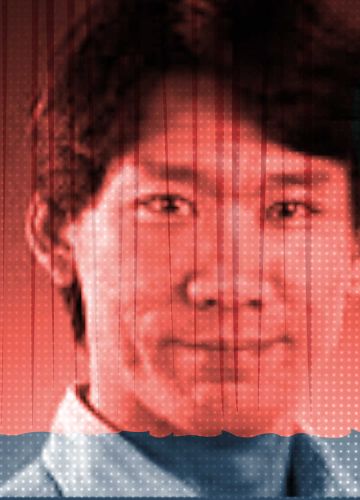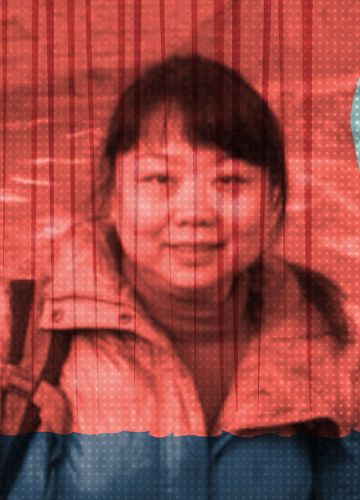The In-Between Space of Social Media Vlogging for Institutional Media

Fang Kecheng

Chen Di
Chen Di’s program, “Chen Di Says” (陈迪说), just five minutes in length, is one of the successful results of traditional media transformation in China, and Chen’s experiences between institutional media and social media can be regarded as a model for others working in the media today. In 2019, Chen Di was named by China’s New Weekly (新周刊) magazine as a “Knower of the Year” (年度知道分子). The magazine said of Chen: “He excels at cool analysis, his discourse refined by a range of disciplines, from political science and sociology to communication. . . . Throughout, he uses his own voice to convey a sense of goodwill and justice to the world.”
The Decline of Institutional Media Power
Fang Kecheng: Greetings, Chen Di. While you’re a well-known media personality, I know this wasn’t your background in terms of training. You didn’t study journalism and communication. Is that right?
Chen Di: Yes, that’s right. Originally, I studied political science at Sun Yat-sen University. After that I went to Johns Hopkins, where again I studied policy – something that has always been a subject of interest to me. After graduation, though, I felt I was a bit short on real-world experience. So I came back to China one year after I graduated in the US. As I went out looking for work, I really wasn’t prepared. My family thought since I had been on the debate team as an undergraduate, and since my presentation was pretty good, maybe I could look into working for a TV station. My family is from Guangzhou, and I was thinking about proximity. So I set my sights on Shenzhen TV. Among the 30 or so satellite TV stations in China, Shenzhen TV was in the top-ten. I was determined to make it there. That was the second half of 2014.
The environment in the Chinese TV industry is really different from what you find in the US and other international media. There’s something really Chinese about it. What I mean is that those who deliver the content and those who actually produce the content are completely separate. You just don’t have one person serving both roles. Which means the person you see on TV can read the script but they can’t do anything else, and the people behind the camera writing things will never appear on screen. So it’s really not what you might imagine.
I was in the news section at that time, and they set up this “commentator” (评论员) role. Actually, it was a really niche role. They never formally hired for a commentator. This, actually, was how leaders at public institutions (事业单位) generally tried to carve out a tiny bit of innovative space in a really rigid system, trying to find a bit of wiggle room. They might feel a certain young person has a lot of ideas, presents themselves well, works on camera, and so they’ll give them an opportunity. In my case, I had been behind the scenes for six months when suddenly, in early 2015, they stuck me in front of the camera when there was no other commentator available. That’s how it started.
Fang Kecheng: Did commentators write their own scripts?
Chen Di: That’s right. The producers might give the commentators ideas, but they wouldn’t write the scripts. News releases, on the other hand, were all written by the editors for the anchors.

Fang Kecheng: I see. Was it back then, during your time at the station, that you started exploring social media?
Chen Di: It was maybe six months after that, once I’d become a commentator. Sometime in the second half of 2015, I registered an account on Weibo to see what expressing myself there was like. What I realized at the time was that essentially everyone speaking within China’s traditional media organizations, whether they were on camera or appearing by name as writers or editors, they all lacked real substance once they found themselves in a user-centered evaluation system [like that on social media]. At a seemingly glamorous TV station, the hosts are heavily made up every day. But the reality is, once they’re thrown into an open and competitive market, they really have no influence at all. It’s a strange situation, actually, and probably a reflection of how the power of the media is declining in the public opinion market of our time.
We used to think that being a reporter on a TV station was such a great opportunity to be seen. There are a lot of people who are on TV, but what they can rely on in the end is only their seniority in the professional community. You might have been doing something somewhere for years and years, but you put your face and your name out in the marketplace and you have no real influence. That’s how 99.99 percent of these people are.
Fang Kecheng: It’s true a lot of senior people in the industry aren’t known to the public. But I think there were still some influential media people on Weibo who were later blocked. Like Wang Zhi’an (王志安), who was at CCTV, for example.
Chen Di: I think there’s definitely several reasons for this phenomenon. It’s true a lot of the people who might contribute the most meaningful voices online have probably been “lost” (消失). On the other hand, if their professional positions actually encouraged people to vote with their feet, if their power in the marketplace was proportional to their professional visibility, then things wouldn’t be how they are now [with relative lack of influence of such media professionals]. So there’s at least one other layer to it, which is that the overall power of institutional media has declined substantially.
As for me, I think when I left Shenzhen TV, a big proportion of my popularity, or influence or whatever, had nothing to do with the television audience. Which is to say most of it came directly from social media, because the conversion rate of influence (影响力转化率) from TV to online is really low. It’s really two fragmented parts now – online users and users of traditional channels.
When we look at those media organizations that have managed to survive, or that have been relatively successful in making the transition to new media, like The Beijing News, they’ve all chosen to choose the way to align themselves with social media. There is no other way. The power is now in the hands of these platforms. It’s not true, though, that any journalist who registers a social media account will be noticed and stand out, that they’ll rise above the others. They have to be able to meet the criteria of social media.
Fang Kecheng: That’s true. When you were in Shenzhen, you didn’t just post to Weibo whatever was broadcast on Shenzhen TV. It was really a completely different type of discourse and way of interacting with people, right?
Chen Di: Sure. By the second half of my time there, I began to realize that actually, when I was working on a script, I was thinking almost entirely about the internet.
With television, basically, because the audience is really unclear, you have to assume your audience doesn’t know anything about an event. Every time, you have to go to considerable length just to walk back through the event. It might be a bit much to call the language used for television “conservative,” but it definitely plays it safe and is more secure.
When you’re facing an internet audience, you won’t know as clearly who these ordinary users are compared to, say, the Big Vs, and you just have to estimate. But you’ll probably have a sense on any particular story of where the general atmosphere is – and your argument strategy is really different [i.e., framing your arguments for the audience through an understanding of the audience.]
The advantages of institutional media identity
Chen Di: The institutional media (机构媒体) are definitely significant and have a real role in China’s content industry and public opinion market, and there are certain ways in which they are irreplaceable. To be perfectly frank, we all know one of the biggest advantages institutional media have, and that is the advantage in terms of qualifications – their licensing advantage.
Strictly speaking, public speech in China still requires a license. Although we now have social media platforms, and it seems that any user has a loud speaker they can use, the truth is that if you don’t have an institutional license any person can take you out at any time at very minimal cost. Let’s say, for example, that you’re a user and post a video that relates to an unfolding situation. Actually, there’s no need even for someone in a [government] agency to set their sights on you. It just takes an ordinary user to issue a complaint using the complaints channel provided by the platform, saying you don’t have the credentials, that you don’t have a license, and that you’re not permitted to post this type of content, and they have the power to remove the content you posted. But if you are licensed, this is another matter entirely. There is still a bureaucratic process involved, and if they want to deal with you the institutional cost is much higher.
Another level, for example, I give an example, Bai Yansong every time he speaks of those things, in fact, from the content of most of the time do not see any breakthrough, bold, innovative, constructive or not. The fact is that his performance itself, this also has its own comment, but why his words will still have weight? Every time even if Bai Yansong sometimes only gives a three-point expression, but his three-point expression still carries a lot of weight. Nowadays, some people like official [media] institutions and others don’t. But official institutions still have a special position in China’s social system, so whether or not your content has that station logo or brand logo in the upper left-hand corner can make a huge difference.
For those who work in China’s institutional media, this can be an insurance policy and a plus – but it can also be a curse, a burden, because no one really thinks you represent only yourself.

Fang Kecheng: Since you joined The Beijing News, you have been entirely oriented toward the internet and toward social media. Is that fair to say?
Chen Di: The vast majority of viewers are now internet users. You can definitely come closer in accommodating users’ tastes. But as for being completely user-oriented, of course you still have to abide by censorship requirements, and the requirements of your employer, so you can’t say this is being completely user-oriented, because those aspects are persistently opposed to the demands of the users.
Shenzhen TV is still an official institution tied very closely to local propaganda. The Beijing News gives people the impression of a very market-oriented media. But in fact, when I arrived here it perhaps wasn’t the best time [for the publication], having already been a long time since its launch in 2003, and I could sense that if the newspaper came across something [in the way of resistance], it would immediately back off [of sensitive issues.]
Fang Kecheng: Did you invent the title of “Internet video commentator” (互联网视频评论员) for yourself?
Chen Di: Looking back to when I started in 2015, I couldn’t find anyone doing the same thing as me. But in fact it wasn’t some huge innovation. It was just putting a person in front of the camera for a few minutes to offer a commentary. This kind of thing had been done already in the 2000s at Phoenix TV, and at CCTV. But to do this sort of thing separately, out on the internet, I don’t know who before me did that sort of thing. At the time, anyway, I didn’t see anyone doing it and having an obvious impact on the market. Later, [Global Times editor-in-chief] Hu Xijin also started doing it, but he was definitely later than me.
Fang Kecheng: Compared to traditional commentators in newspapers and TV, what do you think is the main point of advancement in your work?
Chen Di: I never went through the process of inculcation within China’s domestic journalism profession. When I started writing, in fact, I was totally ignorant about the patterns and protocols of the industry. I just wrote according to my understanding of things, and once I had the “OK” from my superior and people appeared to like it, I just kept things going that way.
So now if you throw me into a college journalism classroom and ask me to teach a lesson, talking to students about how I go about writing, I really don’t know what to say to them. I know they’re studying the usual stuff, stuff about which I have zero knowledge. I know what it is I’m not doing, and then I wonder if this isn’t a reason why what I do is different.
Why do I say that? Why does it seem that the vast majority of things written in the commentary pages of traditional media outfits are all the same? The formula is so obvious. Maybe it’s because everyone went through the same formal study.
Fang Kecheng: It might be a matter of mutual imitation, not necessarily something learned in the classroom. Mutual influence at work.
Chen Di: No one is really going to like that stuff at all. I find it really strange. And I’ve wondered whether it might just be stuff they create in the daily grind of work, using a kind of mechanical method to reproduce things. When I read a piece, I can tell really quickly whether it has an original point of view, whether they’ve really gone through a process of chemical reaction to get somewhere. Of course it’s pretty hard for a very long time of continuous production. But of course this is something that is hard to sustain over the long term.
Fang Kecheng: Your overseas background must also be an important factor. On Weibo, of course, there are others like you with a background overseas. But they don’t like you have an institutional media microphone. So I think you might be at a kind of crossroads, having a rather unique position.
Chen Di: I think the fact that I’m still managing to survive on social media is definitely related to the fact that I’m situated at an institutional media outlet.
What level does an internet celebrity need to reach before they become part of the mainstream social order? This is actually a really interesting question. Although the internet landscape has developed for at least 20 years already, and the social media landscape for 15 years, and although internet celebrities command really strong traffic, and that traffic translates into real money and capital, to what extent can they really become part of the mainstream social order offline?
This is a really subtle matter. [The “Lipstick King”] Li Jiaqi (李佳琪) and [shopping host] Wei Ya (薇娅) are definitely able to do this, but move down this list from these places at the top and you find few personalities that are recognized by the state and the public. There are lots of people on the internet who have huge followings but who will never gain status in a system dominated by politics or the market.
But if you have a formal institutional identity, you can quite easily gain social recognition. Status as a “Big V” [celebrity or public figure with a verified account] is more than enough to take part in events on Weibo, because the vast majority of people there are freelancers. But if you want to take part in an event that is more public [outside of social media circles], then being just a “Big V” isn’t enough.
Fang Kecheng: I’m curious what attitude of the leaders of the newspaper organization at The Beijing News is towards you. Do they hope that you gain more and more followers on Weibo, or do they feel this has little to do with the newspaper?
Chen Di: The professional community and the market are still two separate lines. If you are successful in the open market of the internet users, this is still a very scarce thing for a professional community that boasts about being market-oriented. This can become a crossover advantage for you. If you are part of such a professional community circle, your market-oriented success will give you a clear comparative advantage, and then they will “take you seriously.”
In market-oriented circles, under a market-oriented evaluation system, your identity within a professional community might be something that distinguishes you and offers some benefit. But as a matter of personal choice, I was never prepared to climb the ladder in a professional community. For example, the organizations I’ve worked for have suggested that I should also take on other responsibilities, like reviewing films, that might lend themselves to middle management positions. But I’ve rejected these suggestions outright. This could be more about personal choice, but I think my current situation is better. I think the freest state is not to rely on institutions, because if you rely on institutions there is always someone else squeezing your lifeline. If I rely on my own market success, I’m not afraid of them doing anything to me. If something they do upsets me, then if I want to leave this is something I’m also freer to do. So I think this is still quite good.
So I’m more inclined to view my relationship with the institution as one more of cooperation, as a partnership.
An Era Lacking Imagination
Fang Kecheng: What is the production process of your show like? If you have team members, how do you work together?
Chen Di: Ours is a pretty simple case. My team is actually just three people, and actually it could even be more simplified. I think a lot of things can be done by one person, but of course it takes more time that way.
My own process, first of all, is to choose a topic. My content assistant and I will decide on a topic, write it down, discuss our ideas, and then do background reading. Then I will have some ideas myself about the visuals, such as what images to use for a certain paragraph, a certain sentence. Should we use full-screen materials, half-screen materials, or interactive materials? How should we do the storyboarding? I will draw it out first, and the content assistant may also help, and then the assistant will look for supporting materials. Or there might be times I don’t draw, and the assistant will do the storyboarding work. After the video is editing, we review it. I look at it. My boss looks at it. If things are a bit strict [in terms of content controls], the boss’s boss might review it again and give the go-ahead to send it out.
Fang Kecheng: Do you have a very clear overall direction in terms of content positioning?
Chen Di: I think it’s still important to say what you mean. First of all, the content must be within the bounds of censorship. And then . . . . Actually, I think in recent years there is a lot more resonance between domestic social mood we’re seeing in China and the mood we see overseas. 2020 was another election year in the US, and the things we’ve seen in the US [in terms of identity politics] are things we’ve from Chinese internet users for a longer period of time. In other words, we’ve actually seen for much longer in China’s public opinion landscape the things that have reared their heads in the US since 2016. The US hid these things better before 2016, under the façade of the Obama years. But now that they are exposed, with those on the right and progressives staunchly opposed, we can see that this identity politics is actually something that has existed all along in Chinese society. It’s the same thing. The Trump fans in China [who support social Darwinism, racism and misogyny] are showing these trends that overlap with the values of Trump supporters in the United States, which is a direct backlash against all progressive values. Nowadays, in China’s media or when speaking publicly, there is no room at all for even very restrained complaints against the establishment. What you can oppose and advise against is only directed at this anti-progressive popular sentiment. So a lot of my content later headed in this direction.

Fang Kecheng: What is your relationship with the Weibo platform like? Of course they like the traffic you bring, but to a certain extent they must have some concerns in terms of risk, right?
Chen Di: I’ve performed really well on the platform, actually. This might also be because I’m not the sort generally to invite trouble. First off, I have a [media] unit. And I don’t really have the desire to invite trouble. If I can remain within the propaganda lines of the institutional media, operating within their discipline lines, I should be outside the concerns of microblogging platforms.
Fang Kecheng: Is Weibo still the main source of traffic for your videos? Or are you present on other platforms as well?
Chen Di: No, [the short video apps] Douyin and Kuaishou are really not suited to us. There’s too much limitation in what you can do in just one minute. I’m not sure if Bilibili is somewhere we’ll be able to go, owing to our corporate relationship. Because the videos are all from The Beijing News, and they’re produced with money from Tencent, it’s not possible to go to Bilibili [which directly competes with some Tencent products].
Fang Kecheng: What do you think of Weibo as an opinion platform?
Chen Di: I think there has been a visible drop in the amount of content on Weibo recently. It used to be that if I swiped once at noon and then again at 6PM, it would take me a long time to scroll through everything. But now it’s very quick. I can’t even tell you how many people that I follow have stopped updating. It’s really like people are giving up, and those who are even remotely interested in public affairs are no longer vocal. And I’m sure it’s not just the case with Weibo either. Honestly, what’s the point of having more content on Douyin and Kuaishou? This is the shrinking of China’s public sphere and marketplace for ideas. These new short video platforms aren’t really platforms that serve that role.
Fang Kecheng: Do you think it is possible to achieve a happy medium between traffic and quality?
Chen Di: In fact, now I feel like I can say whether or not a video or a piece of writing has the potential to be a hit or not. It’s a basic understanding. Of course, there is still a margin of error. No one can guarantee that every piece of writing will be a hit.
I’m not the kind of person who chases after traffic, like those over at [the post-90s public account] Youth Courtyard (青年大院). Very often the things I write are things I want to say even if the traffic doesn’t come. In my position, I don’t feel the need to chase after traffic.
Fang Kecheng: It’s just like a person who already has the traffic to say the traffic doesn’t matter.
Chen Di: Maybe I seem too Buddha-like about it [i.e., casual and carefree]. And why not? This is just how it is. I see a lot of people with consciences today already becoming very Buddha-like about things, just hoping to continue supporting their own existence. Either they’ve been snuffed out, or they choose to just stop speaking in order not to be snuffed out. Or in some cases they’re just disheartened by the current “base” of internet users, finding it totally meaningless.
Fang Kecheng: You once said in an interview that you were bewildered by the lack of truly competitive products in the market. Is this still the case?
Chen Di: Not really. Now we have Shanghai Observer (观察者网) out there with Observer Video (观视频) trying to do some things.
Fang Kecheng: That’s an entirely different value orientation from you. [Note: Shanghai Observer is generally recognized to be a highly nationalistic media outlet.]
Chen Di: Yes, that’s true. But in terms of form, they are doing what I said back then no-one was doing competitively. Judging from their traffic or heir market response, they are still doing quite well. Of course, I’ll never earn the level of traffic they do.
Fang Kecheng: Do you personally feel disappointed with the Simplified Chinese internet (简体中文互联网)?
Chen Di: I’m really disappointed with the whole world now. It’s probably not just the world of Simplified Chinese that’s really the problem right now. I think it’s probably a problem shared by the people of these first three decades of the 21st century. Not just in China, but in many places in the world where we see huge conflicts behind which there is no fresh imagination, or any source to be drawn from in terms of older imaginations that can give direction to their struggle.
What are some of the expectations and aspirations we’ve had for significant social change over the past 10 or 20 years? Actually there are none. This is an era totally lacking in imagination. Even among those who have driven relatively powerful social movements, like Black Lives Matters or MeToo, there is no blueprint for how to achieve the kind of society they want. There are no available sources of ideas they can draw from.
When it comes to that other mass of people who seem so much more powerful in terms of volume and emotion, such as the far-right, and those who oppose identity politics, there is even more [a lack of real ideas]. They have nothing at beyond a return to the so-called “good old days,” to their barbaric old days. There is nothing underneath, and no program for how to get there. Compare the situation to the 20th century and things are so bad. 100 years ago, the period between the two world wars was similar in many respects to the present, at least in terms of the state of the world. Those were very ambitious times, and programs for social change and global change were unfolding in the background. Even taking fascist agendas into account, the times were extremely ambitious, looking forward at least to change, with programs to be realized.
But today it really doesn’t seem there are such programs at all. By that I mean that people today, even if they “struggle” more and more powerfully, or grow more and more reactionary, they really have no idea what the next step is, what direction to go, what [kind of society] to become. There seems to be no bottom. And it’s all very tiring.
I feel quite hollow now. Especially these past few years, when there’s nothing to strive for, which is different from how it was in the past. We used to sincerely believe that we would be the chosen generation, that we would be able to pursue personal experiences, and even participate, becoming an important force for historical change, a generation to be remembered by future generations.

Fang Kecheng






